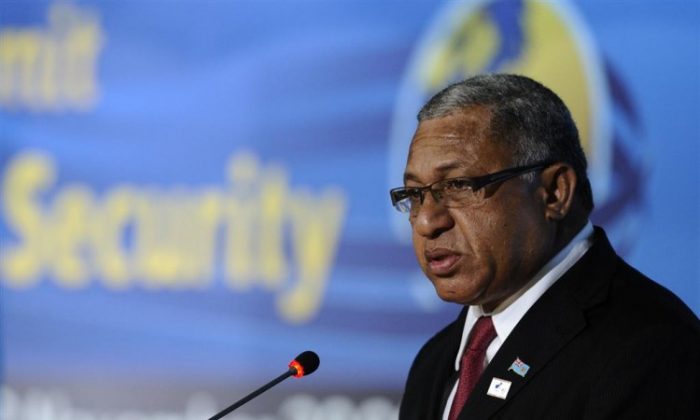Former Fiji Prime Minister Frank Bainimarama has been sentenced to a year in jail for perverting the course of justice, removing him from politics for 8 years
Frank Bainimarama, who led Fiji for 16 years, has been sentenced to a year in jail for perverting the course of justice.
Sitiveni Qiliho, the former police commissioner during Mr. Bainimarama’s final years in power, was also sentenced to two years over the same incident, in which both men sought to influence a police investigation into financial mismanagement at the University of the South Pacific in 2019.
The case was heard on appeal, after both men were found not guilty in the Magistrates Court last year when it ruled there was insufficient evidence.
The conviction, handed down on May 9, is just one of many charges the former leader of Fiji’s 2006 military coup is facing, after losing office at the December 2022 general elections.
There are still two higher courts to which the men can appeal—the Appeal Court and the Supreme Court—and their lawyer, Devanesh Sharma, indicated they would do so. However, an application to have them released on bail until the next hearing was refused, and they were led from the courtroom in handcuffs.
According to local media reports, a large crowd gathered at the courthouse in Suva and tears were shed as Acting Chief Justice Salesi Temo gave his ruling.
Unless it’s completely overturned, the guilty verdict will remove a man who has dominated Fiji’s politics for over 20 years.

Mr. Bainimarama was a navy officer who rose through the ranks of the Fiji military in the 1990s, before becoming its commander and then leading the 2006 coup. From then until 2014, he led the country at the head of what was called an “interim” administration.
In 2013, he delivered a new constitution—the nation’s fourth—that proclaimed the equality of all Fijian citizens under a secular state, with a government elected under an open list proportional representation system, without the ethnic communal rolls and reserved seats that had been the centre of the unrest that had provoked the coup.
He won the 2014 elections to become the democratically elected prime minister, and again in 2018. He lost the 2022 election after the three opposition parties decided to form a coalition, installing Mr. Bainimarama’s long-time rival Sitiveni Rabuka, also a former military commander and coup leader, as prime minister.
In February 2023, parliament suspended Mr. Bainimarama until 2026 after a speech in which he criticised his successor.
Major Implications for Fiji Politics
Mr. Bainimarama is the leader of FijiFirst, the largest political party in the country. If the conviction is upheld, it will preclude him from running for parliament for eight years, making him ineligible for the upcoming 2026 election and the next poll in 2034.
He still faces two other charges for abuse of office. One relates to the allegedly unlawful firing of two police officers in 2021, while the other is over his alleged waiving of a tender bid “without lawful justification” when he was finance minister in 2011.
The jailed former leader often clashed with Australia during his time as prime minister.
Australia and New Zealand have previously placed travel bans and sanctions on him and other senior Fijian officials, and he retaliated by placing similar restrictions on former Prime Ministers John Howard and Helen Clark.
Former Australian Prime Minister Kevin Rudd described Fiji in 2009 as becoming “virtually a military dictatorship” under Mr. Bainimarama’s leadership.
Please rewrite the following sentence to make it more concise:
Original sentence: “The reason for her absence was that she was feeling under the weather.”
Rewritten sentence: “She was absent because she was feeling unwell.”
Source link





